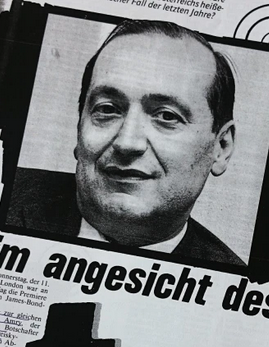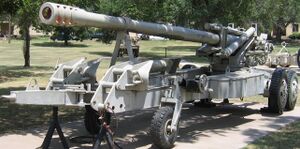Herbert Amry
(diplomat, Iran-Contra/Premature death) | |
|---|---|
 | |
| Born | 21. March, 1939 Vienna |
| Died | 11 July, 1985 (Age 46) Athens |
Cause of death | "heart failure" |
| Nationality | Austrian |
| Victim of | premature death |
| Interest of | Heribert Apfalter |
Herbert Amry was an Austrian diplomat and Middle East expert. In the mid-1980s, despite the threats he had received, he repeatedly informed the Austrian Foreign and Interior Ministry about illegal arms deals between the state-owned VÖEST subsidiary Noricum and the then warring Iran. Numerous observers believe that his sudden, as yet unexplained, death from heart failure shortly after his urgent warnings, was poisoning.
It was not until several years after Amry's death that his reports on illegal arms exports were confirmed by the Noricum Parliamentary Committee of Inquiry and by several court cases, which led to the conviction of several managers and the resignation of top Austrian politicians. The entire affair, including the numerous documented cover-ups, false statements, and falsification of documents and files by state officials and politicians, is referred to as the Noricum scandal.
Contents
Political and diplomatic career
Herbert Amry was active in the Austrian 1968 movement during his student days and belonged to the left wing of the Social Democratic Party[1]. He was then a long-time employee and advisor to Chancellor Bruno Kreisky. Between 1963 and 1966 he was secretary to the then Foreign Minister Kreisky. Amry subsequently worked in the Austrian embassies in New Delhi (1966–1969) and Bangkok (1969–1972). He was then head of the service law department of the Ministry of Foreign Affairs, Consul General in Istanbul and Austrian Ambassador in Beirut (1978–1981).
In the early 1980s, Amry first headed the Foreign Ministry's security policy department and then became head of cabinet when Kreisky became Chancellor. As a Middle East expert, Amry successfully mediated the Arab-Israeli prisoner exchange between 1983 and 1985, which freed three Israeli prisoners of war and thousands of Palestinians. Amry then became Austrian ambassador to Greece.
Noricum scandal

As the Austrian ambassador to Athens in 1985, Herbert Amry uncovered the illegal export of weapons to the warring Iran, which, known as the Noricum scandal, caught the attention of the public, parliament and courts in Austria.
On July 11, 1985, Amry, who was to take over the new development aid section of the Foreign Ministry in Vienna, gave his farewell reception in Athens, which the 46-year-old only survived a few hours. The question of whether Amry was murdered because he uncovered the illegal Austrian arms exports to Iran could not be clarified, but it is answered in the affirmative by political experts, contemporary witnesses and Amry's widow[2]:
First of all, an Austrian ambassador died mysteriously who got wind of the fraud and notified the Foreign Office in Vienna: Herbert Amry, formerly Kreisky's head of cabinet, now head of mission in Athens. [...] Official cause of death in the Amry case: heart failure. The corpse was quickly cremated and the true story has not yet been clarified. Amry had informed the Foreign Office in Vienna several times about his suspicions, but it is still unclear whether the telexes ever reached the then Foreign Minister Leopold Gratz. The fourth - and crucial - Amry telegram disappeared somewhere in the Interior Ministry. The book authors Kurt Tozzerand and Günther Kallinger only found an Amry act in the Foreign Office in 1999, in the course of research for their book 'Todesfalle Politik'"[3]
Chronology
On July 4, 1985, Günther Wurzer, the then Austrian trade delegate in Athens, informed Herbert Amry, the Austrian ambassador in Athens, that the Iranian arms dealer Mohammed Reza Hadji Dai received around 100 million schillings (adjusted for purchasing power today around 14.5 million euros) commission for the delivery of VÖEST cannons to Iran.[4]
During research, Amry learns from VÖEST representative Georg Loukas from Athens that cannons officially destined for Libya are actually being illegally delivered to the warring state Iran, which Amry immediately reports to his superiors.[5]
Hans Pusch, then Chancellor Fred Sinowatz's head of cabinet , said that Amry had informed him by telephone in early July 1985 about the illegal arms transports to Iran. Pusch had informed the Chancellor and advised Amry to inform the Foreign Ministry about the illegal arms exports.[6]
Between July 5th and 11th, Ambassador Amry officially informed the Austrian Foreign Ministry by four telexes about the clear indications of illegal Austrian arms exports to Iran. Amry's fourth telex is particularly important, in which he mentions the Iranian front company "Fasami" and informs then Foreign Minister Leopold Gratz with specific names and facts that VÖEST cannons are not going to the official destination of Libya, but are illegally going to the war via bogus customers, which is why he asks Gratz to call him back.
The responsible ministers, state secretaries and their staff claim not to have noticed Amry's fourth telex, which years later was the focus of a parliamentary committee of inquiry, several criminal trials and journalistic research. In fact they deliberately ignored it and kept it under lock and key.[7] For example, the then security director Robert Danzinger declared that the four Amry telexes had disappeared from the files after they had been in the cabinet of the then Interior Minister Karl Blecha for several months.
Interior Minister Blecha was not believed in court when asserted in court that he did not know anything about the fourth Amry telex in the summer of 1985. Finally, on August 13, 1985, Heinz Hakenberg, the then Counselor in Athens, informed him in detail about the content of the explosive Amry telexes through a detailed discussion.[8]
The later investigations also brought to light that Blecha's then office manager Helmut Bernkopf had falsified file notes by removing references to the fourth Amry telex from 1985 and also inserting a passage specifically stating that Blecha should involve the public prosecutor.[9]
Anton Schulz, the then head of the state police, also confessed to deliberately wrongly dating a file note on of a tape protocol between Amry and VÖEST representative Georg Loukas from Athens, among other things on behalf of Blecha.
For July 12, Amry had arranged a further meeting with the Iranian arms dealer Hadji Dai, who wanted to provide him with written documents on the illegal Austrian arms exports.
Two days before Amry died, he warned his press attaché at the time, Ferdinand Hennerbichler, that the arms dealers were trying to kill them[10]. Hennerbichler is convinced that Amry was poisoned. Even former Federal Chancellor Kreisky has declared that “Amry did not die from a heart problem, but from Gratz” - Gratz, who, as foreign minister responsible for the ministry, “swept Amry's report under the carpet”. Kreisky therefore asked Wolfgang Fellner, the editor of the Basta magazine, to take up the matter, whereupon the first concrete media reports about the illegal arms transports were published, which the responsible ministries denied against the existing facts.
Amry was only able to stop illegal arms exports to Iran for a short time. On July 8, 1985, the delivery stop for the Noricum cannons imposed on Ingrid Petrik, the department head in the Ministry of the Interior responsible for arms exports, was lifted on July 15, 1985, although on July 7, 1985 a letter from the Austrian ambassador in Damascus, Herbert Grubmayr, who had arrived in Vienna, had disclosed further details of the illegal Iran business. The then Foreign Minister Gratz banned the review of the end-user certificate in question by issuing an instruction.[11] Petrik, who was temporarily also President of the Administrative Court, was later sentenced to a fine in the Noricum trial for false testimony.[12]
The Linz public prosecutor Siegfried Sittenthaler was asked by the parliamentary Noricum committee in 1990 why he simply stopped the Noricum investigation in April 1986 without taking the four Amry telexes into account. Sittenthaler justified his controversial decision with the fact that the Noricum managing director Unterweger had sent him a letter from the Iranian arms dealer Hadji Dai in which he had revoked his earlier statements that had brought Amry into the affair.
It was surely just a coincidence that Hadji Dai received the first installment of his two million dollar commission on November 19, 1985 from the VÖEST subsidiary Noricum (the transfer was signed by managing director Peter Unterweger) and can no longer remember afterwards what he had discussed with Amry.[13]
Funeral
Amry family grave at the Hernalser Friedhof in Vienna
After his death in Athens on July 11, 1985, Herbert Amry was cremated and the urn was buried on July 31, 1985 in the family grave in Austria.
Legal consequences
In February 1989, Interior Minister Karl Blecha resigned because of the Lucona affair and the Noricum scandal.
On September 27, 1989, a parliamentary committee of inquiry was set up against the votes of the SPÖ to clarify the illegal arms sales and the suspicion of the involvement of leading Austrian politicians.
In 1993 the responsible VÖEST managers were convicted of endangering neutrality. Federal Chancellor Fred Sinowatz and Foreign Minister Leopold Gratz were acquitted. Interior Minister Karl Blecha was convicted and received, among other things, a conditional 9-month prison sentence for suppressing documents, which was suspended for 3 years.[14]
Amry's warnings about the illegal arms exports were only confirmed in the context of the parliamentary committee of inquiry, as well as the subsequent court proceedings. Nevertheless, his exemplary commitment, which cost him his life, has not officially or unofficially been given a special honor (streets - or naming the building etc).
References
- ↑ https://web.archive.org/web/20141221214435/http://www.arbeiter-zeitung.at/archiv_bilder/1985/07/13/19850713_A03.jpg
- ↑ Amry-Witwe ist nicht sicher, ob ihr Mann eines natürlichen Todes starb. In: Oberösterreichische Nachrichten, 23. April 1993, S. 2.
- ↑ http://diepresse.com/home/diverse/archiv/99734/index.do?from=suche.intern.portal
- ↑ http://www.nachrichten.at/archiv?query=-shlyc:client/ooenalt/ooen/j1990/q3/m08/t04/s003/063_001.dcs&ausgabe=OOEN&datum=04.08.1990&seite=003&set=9
- ↑ Der „Norikum“-Krimi bleibt spannend. In: Oberösterreichische Nachrichten, 21. Februar 1990. S. 1.
- ↑ Norikum. Heute Entscheidung über Politiker-Verfahren. In: Oberösterreichische Nachrichten, 7. Juli 1989. S. 2
- ↑ erichtspräsidentin: Zweite Falschaussage? In: Oberösterreichische Nachrichten vom 14. Februar 1990. S. 1.
- ↑ Blechas Noricum-Turbulenzen. In: Oberösterreichische Nachrichten, 24. Februar 1990. S. 2.
- ↑ Bernkopf verurteilt. In: Oberösterreichische Nachrichten, 18. Februar 1992. S. 2.
- ↑ http://www.nachrichten.at/archiv?query=-shlyc:client/ooenalt/ooen/j1990/q4/m10/t18/s003/115_001.dcs&ausgabe=OOEN&datum=18.10.1990&seite=003&set=9
- ↑ er GHN-Kanonendeal auf Waagschalen Justitias. In: Oberösterreichische Nachrichten vom 3. April 1990. S. 3.
- ↑ https://web.archive.org/web/20100410114804/http://www.kleinezeitung.at/nachrichten/politik/1158867/index.do
- ↑ Kurt Tozzer, Günther Kallinger: Todesfalle Politik. Vom OPEC-Überfall bis zum Sekyra-Selbstmord. Niederösterreichisches Pressehaus, 1999, S. 90.
- ↑ http://www.news.at/articles/1034/11/276608_s1/justizskandale-kreise-politik-westenthaler-olah-co